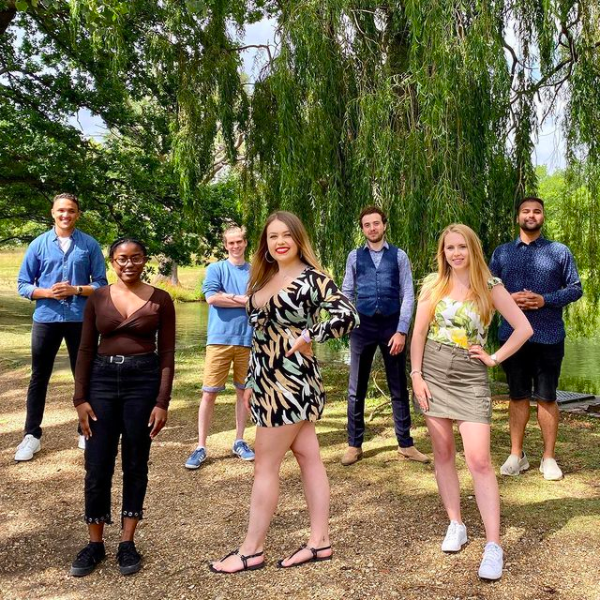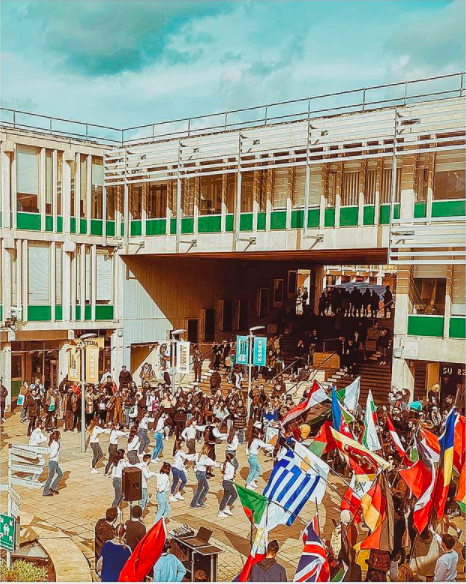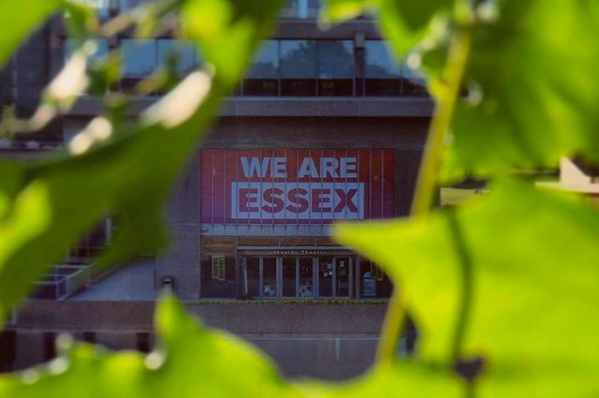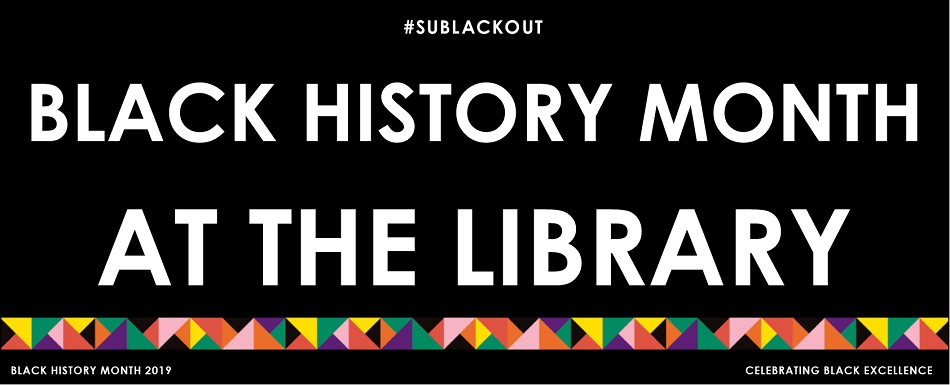After a week of debates for the Leadership Race, voting opened to elect next year’s Sabbatical team and Student Community Officers. Tom Abadie talked to Natalie Bell-Surette and Jennifer Day about the role of these individuals in the Student’s Union.
On the 10th March, the student community will be voting to elect its future representatives at the head of the Students Union. These range from Vice President International, Vice President Student Experience, Black Officer, President and many more. The main Sabbatical team (SABBs) is constituted of 7 roles, which are paid full time to work with the students as well as the rest of the Students’ Union and the University. Additionally, the Loughton President is part time but paid. On the other hand, we have the Student Community Officers (SCOs) are part-time students who volunteer to represent their communities at the highest level. These range from the Black, Asian, LQBTQ+ and more communities. We will get into the specifics further down the line, but it was important to set the stage.

The two people I talked to are involved in the Students’ Union as well. Jennifer Day has been working at Essex for 18 months and works as the student engagement manager. She handles the Leadership Race, as well as Parliament and works closely with SABBs and SCOs. The main focus of our interview was on Sabbatical Officers, which she defined as the “leaders of the Students’ Union”, as they seek to represent the students at the highest level and are the face of the students when it comes to the university. “They are change-makers, make sure the students’ voice is heard and they’re the ones that can make real change as well” she added. Having worked with other Students’ Unions, she could really vouch that each SU has their own specific Sabbatical teams and that they really depend on the type of campuses you get. The Essex Community being very international, it is crucial to have a VP International for example to represent those international students, while this might be less the case in other universities. Each SABB has a specific role, some represent sports clubs, others the welfare support for students, the education of the students but also their engagement for example. The roles are created by Parliament, which created the VP Community and Engagement role last year for example. These officers are trustees, represent the students and have specific roles when it comes to their focus.
As part of the Education Act, every university has to have a Students’ Union and therefore Sabbatical officers to represent the students at the highest level, but there is no legal binding that the university and the SU have to get along. However, it is in the best interest of both that the relationship does work well in order for the students to get the best out of their experience and the fees that they are paying for education as well. By listening to the students, the sabbatical team will relay the thoughts of the community to the university. To give an example, while the VP Community and Engagement is new this year, a part of the individual’s role is to have one to ones with the SCOs to talk about issues happening in their communities, as well as help and support when the communities want to start campaigns.
It is difficult to really embody the day-to-day of a VP as it is constantly changing, with new campaigns and new missions changing, but they are ultimately in contact with students, whether it is directly or with student bodies such as the Blades executive team, in order to really drive the student interest forwards. It has been difficult this year to interact with students as they cannot simply stand on university squares and talk directly to students about their issues as everything is online, but they have found other ways of engaging with the students.
By being elected by the student community, the Sabbatical team is held accountable by these same students for their role. Candidates do not run on manifestos anymore to avoid false promises mainly, but also because for reputational and legal reasons, they cannot necessarily attain the things they promise they will do, or simply because it has been done and they didn’t know about it. Therefore, the SABBs follow the Big Plan when it comes to what the students regard as most important that year. The Big Plan is voted on at the end of the previous year by students, who decide what are the most important matters for the next academic year and what the Sabbatical team should be looking at tackling. This can be reducing plastic on campus, improving the transport system or more importantly this year, tackling isolation and improving education online. The Big Plan is also a major part of the strategic plan set out by the SU for the year and will therefore support the SABBs to attain their objectives by completing what has been asked by the student community.

The SABBs are elected by all three campuses and therefore all students hold them accountable for their actions. They hold a blog to keep everyone up to date with what they are working on but more importantly Student Parliament is a way of showcasing their work but also having a structured way of holding them accountable. Having the interaction between the Parliament Reps and the SABB team is crucial. The Reps can challenge what the SABBs are doing, ask them questions and show their discontent when they (or the community they represent) are unhappy with the work that is being done so far. The Reps can also bring up new things on the agenda that they want to discuss with the SABBs, and push for significant change. While Parliament is not something that is advertised enough, and is clearly lacking visibility, it is a clear democratic way of challenging the status quo as well as holding the SABBs to account for their actions.
Jennifer then underlined that when graduating or while still doing your studies, it is very hard to find a role that will give you this much power to create change within the university. It is therefore very important for students to choose who represents them at the highest level. Without manifestos, looking at skills and leadership qualities in the candidates would be vital in choosing who to elect, in order for them to better represent the students and their voices. To put into perspective the real impact of their roles, I asked Steven Haugh (Director of Marketing and Strategy) for some of the changes that have been made by Sabbatical Officers over the years:
- 24/7 library – one of the most significant and impactful. At first the elected officers worked with the library team to introduce 24 hour opening during the exam period. Then, in 2018 the officers worked with them to have it open 24/7.
- Laptop hire – in 2018 the officers also worked with IT services to introduce a free laptop loan system so that students can have equal access to laptops
- Free printing – in 2019 student officers acted on feedback from students and worked with the university’s IT department to remove the cost for printing on campus, saving students £££
- Anti-racism campaigning – the elected officers have driven important campaign work challenging racism in all its forms, including work on decolonising the curriculum, closing the BAME attainment gap and support for the Black Lives Matter movement
- Gender neutral students – officers including the VP Welfare, President, Trans Officer and LGBTQ+ officer worked with the uni to convert toilets on campus into gender neutral toilets
- Saving Top Bar – in 2010 the elected officers, led by the SU President, successfully over-turned university plans to close Top Bar and instead won support for a refurbished Top Bar alongside a new university restaurant, Fusion
- SU Fireworks – the SU’s free annual fireworks event on the Colchester campus regularly attracts upwards of 5,000 students and was the brainchild of the VP Services & Communication in 2013
- Campaigning on fees – Essex officers have continued to campaign against the marketisation of education, from taking coachloads of students to the major protests in London in 2010 to leading calls from SU’s nationally this year for government to reduce fees in light of the pandemic
- Exams campaign – the SU’s annual exams campaign (including the SU Angels) was established with the elected officer team in 2014 and has been built on by generations of elected officers since, providing free advice and support (including hot drinks) to students at the most stressful point of the year
- No detriment policy – the policy brought in last year as a safety net for students taking online exams during the pandemic was the result of collaboration between the university and the elected officers
- Name change policy – as a result of issues brought to light by the Trans Officer, the university changed their policy to allow students to have a different name on their uni ID card to their birth certificate
- Boobs aren’t news – in 2013 our VP Welfare led national calls for shops to boycott The Sun and The Star newspapers over their outdated and sexist topless page 3 feature
- SU Thursday market – the ever-popular student market on campus was driven by the student officers, with the aim of giving students increased variety and access to quality local producers
As well as all of the above the elected officers have also been behind campaigns and changes including:
- Creating the International Students Association to increase representation for our international students
- The fixing of the library paternoster (coming very soon…)
- The introduction of the Big Plan to give students a direct say in the annual priorities of the SU
- Setting up RAG and raising thousands of pounds for charities
- Setting up Just Play to increase student access to sport and exercise
- Supporting a student initiative to develop the Night Ninjas welfare support in SU venues
- Contributing significantly to Essex winning Uni of the year in 2018
As you can tell the list is very long and there are many more things that have been done over the years. These have been done in collaboration with the university rather than forced upon them, reiterating the importance of the strong relationship between the SU and the university. Jennifer finished the interview by saying “it is absolutely vital that students vote so they have a say in who represents them” which I think perfectly wraps up the interview.

I then talked to Natalie about the role of the Student Community Officers and how vital they are at the university. Natalie Bell-Surette is a student engagement coordinator, and she works closely with SCOs and VP International as international students are a community in itself. As mentioned above, the SCOs are part time volunteer students who work closely with the communities at the university. As unpaid officers, they are held accountable by the students part of their communities. Parliament enables the communities to hold these officers to account, as engaged and non-engaged officers are held to the same level of accountability. They help communicate the voices of the students in their group, organise campaigns and help the liaison between their group and the university, through the SU. They also work closely with people like Natalie or the marketing team to change things on campus, such as introducing gender neutral toilets, which was done mostly by the LGBTQ+ officer a few years ago. Changes can be very small on the short term, but also longer-term issues such as decolonising the curriculum, which has been a matter of interest throughout the country. Importantly, while the SABBs and SCOs are not always responsible for projects from start to finish and can’t change things on their own, their input is crucial to moving things forward.
The role is very broad, and it changes depending on the communities, but the basis of the role is representation. A lot of SABBs have had a role as an SCO beforehand. The prime example is VP Welfare, which has for recent years been elected after being LGBTQ+ officer for example. Some do several years as SCOs before becoming a SABB and they have a great understanding of certain communities and it really helps with communications when they come into the paid roles.
When it comes to understanding what makes you part of a community, most students are part of at least one if not more communities. Women, black, Asian, International, Student Parents, LGBTQ+ and so many more communities are all represented at the University of Essex and they all have their specific needs. There is somewhat of a distinction between liberation groups and non-liberation groups. The first, you are born with the specificity of that group such as gender or ethnic background and are usually more political. The latter are more related to studying with life choices such as mature, postgraduate or student parents. Each campus has its specific SCO roles, such as not having a PGR officer in Loughton as there are no PGR students there for example. Services officer was also brought in this year as it was needed by the student community. These changes are all voted on in Parliament. While there are many SCO roles this year that have not had any candidates come forward for the roles, it is crucial to understand how important they are on a day-to-day basis and how big their role is when it comes to shaping each student’s experience at university.

Natalie defined the role of SCOs as being somewhat in the middle of a triangle, with the community being the large group at the bottom of the pyramid, then the SCOs in the middle in order to communicate to the university, the decision makers. With the officers in the middle, the communication line would not be fulfilled, and communities would not be heard as much. The peer-to-peer relationship between communities and their officers enables a strong relationship between them, truly speeding up the process to make change happen or to voice concerns to the people higher at the university. The officers would then have a link with the engagement team, whether it be Natalie, her colleagues or someone like the VP Community and Engagement, which can then discuss issues or general matters with the SCOs. The SABBs support these SCOs when it comes to bigger issues: as they are volunteers and still focussing on their studies, the paid VPs or President sometimes have to step in to support these students in order for events to go ahead of issues to be addressed properly on the long term.
One of the first things SCOs did in the time Natalie has been at the university was having the university take off the tax on menstrual products, which might seem normal now on campus but was definitely not the case before. After discussions with the university, all parties agreed the price difference was important to students and could be covered by the university. They might take a bit of time to get into the roles, with the overwhelming first few weeks with Freshers and more, but once they are set in, more or less after Christmas, the real work begins, and they do throw in a lot of amazing campaigns. Some put forward Black History, others try and sensitise students to issues that face their transgender classmates for example. The connection between the SCOs and their substitute for the next academic is crucial in order for projects to continue on the long term and really have the continuity in these campaigns.

There are two key things that have to be noted with SCOs. First of all, like SABBs, they do not do it for themselves but for the student community or the community they represent. They selflessly put their time forwards in order to help others, particularly when they are volunteers. And the second point is that yes there are there to bridge the gap between students and the SU, but they also bring up issues that the SU would not have thought of. There being a minority of people coming from a black background working for the Students’ Union, the BAME community might feel unrepresented and therefore need their SCO to bring up issues they are facing, that the SU might not have thought of.
Through this article, with the help of Natalie, Steven and Jennifer, I hoped to show how essential the Sabbatical team and Student Community Officers are to everyday life at the University of Essex. Many will be elected this week, but there are still empty positions for SCOs for next academic year. So, if this article has inspired you to help out your community, whatever it may be, I am sure you will find a role that is open for you for next year. A big issue that has raised during these elections was the lack of transparency and the accountability of the officers, I hope this is a step in the right direction.